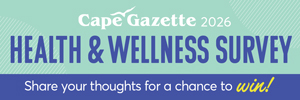COVID’s impact on underserved Delawareans: A familiar story
While more and more Delawareans receive COVID-19 vaccinations, the state is seeing a notable drop in testing for the virus – a trend throughout the U.S. Public health experts say that, considered together, this is a positive development wrapped in a potentially worrisome one.
Just as concerning, healthcare disparities persist in Delaware in the distribution of COVID-19 vaccines; as an example, Blacks make up 23 percent of Delaware’s population, yet account for just 12 percent of fully vaccinated Delawareans as of May 6.
The effectiveness of testing as a strategy for slowing the spread of communicable diseases is a lesson Delaware learned during an earlier epidemic – one that shares vast similarities to what we are experiencing today in our state – the human immunodeficiency virus. This is something that we at the Delaware HIV Consortium and the state’s other AIDS service organizations have dealt with before.
Today, over 35 years since the onset of the AIDS epidemic, and just over a year since the beginning of this new pandemic, Delawareans living with HIV, and populations with similar socio-demographic characteristics, are experiencing an outsized impact from COVID-19 and will for the foreseeable future. Additional support from the federal government, State of Delaware and our communities as a whole is called for in this time to meet these needs.
Earlier this year, the University of Delaware’s Disaster Research Center, in collaboration with the Delaware HIV Consortium, conducted a study examining the social and community impacts of COVID-19 on Delawareans living with HIV. The study focused on community members in greatest need of economic and healthcare support - those receiving benefits from Delaware’s Ryan White Program HIV/AIDS Program, and its report was released in March.
The study’s findings highlight the many difficulties people living with HIV dealt with during the COVID pandemic, much of which – housing and food insecurity, inconsistent access to transportation, healthcare and technology (including telehealth), elevated anxiety, depression and trouble with sobriety – can be directly or indirectly linked to economic instability. For many Delawareans living with HIV, COVID-19 exacerbated an already untenable financial situation.
Many low-income people living with HIV are being forced to choose life-sustaining activities that vastly elevate their risk for COVID, such as moving in with unrelated housemates who may not follow safety precautions, taking on additional jobs that frequently expose them to the public, or sharing protective gear, in order to avoid financial trouble.
“These are decisions that could cost you your life, or [endanger] someone else’s life,” said one study participant.
Yet, these challenges are not just affecting those with HIV. With 11 percent of Delaware residents living below the poverty line, tens of thousands of others are feeling these same challenges.
Even after all Delawareans have access to the vaccines, the state will need to remain vigilant and maintain a robust COVID testing system.
There is more that we could, and should, do as a state to take advantage of the current moment to both address the new challenges that populations most impacted by COVID are experiencing, and ensure that we are prepared for our next crisis:
- Build on the state’s existing COVID-19 testing framework to expand and strengthen access to preventative health services – screening and testing – particularly targeted to under-resourced populations
- Prioritize investment to ensure access to, and training for using technology for low-income and other marginalized Delawareans to reduce barriers to healthcare services
- Increase support for Delaware’s social service sector who, during this past year and into the future, make up much of the social safety net for Delawareans and help keep them connected to vital services including healthcare, support services, food assistance and housing assistance.
When there is no longer a need for COVID testing sites, we are all hoping to get back to a sense of normalcy. However, reaching normalcy will be hard for many Delawareans, including some living with HIV and others that COVID-19 has substantively affected. Investing in these three proposed areas should help ensure that as a state we are prepared to help meet these needs.



















































